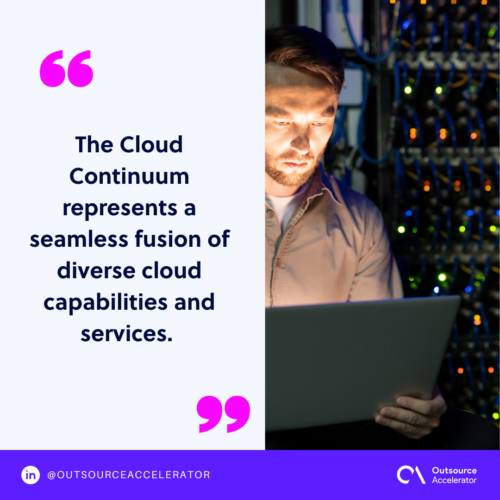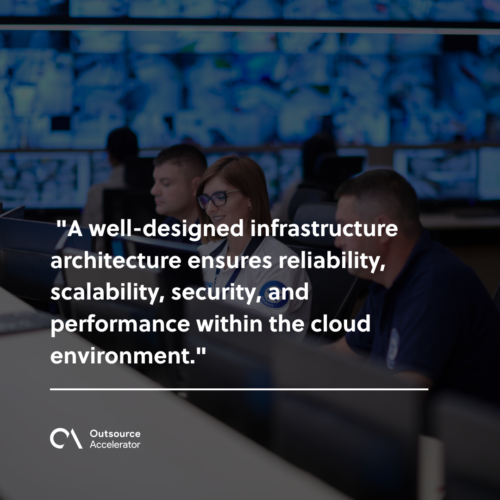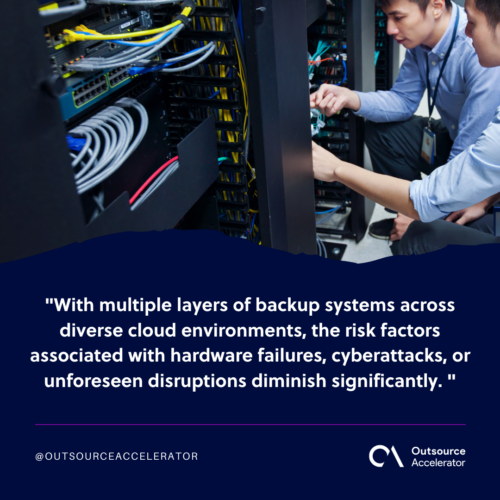What is Cloud Continuum?

Change is constant, and organizations know this well. That’s why they find themselves at the crossroads of innovation and efficiency.
The cloud, once a conduit for on-demand resources, has evolved into an expansive ecosystem fostering unprecedented growth and transformation.
This evolution isn’t just about migrating data; it’s a paradigm shift that gave birth to ‘Cloud Continuum.’
This article delves into the significance of the Cloud Continuum to businesses.
Cloud Continuum defined
The Cloud Continuum represents a seamless fusion of diverse cloud capabilities and services. It covers a spectrum of cloud computing environments, such as:
- Data centers
- Private clouds
- Public clouds
- Hybrid clouds
- Multi-cloud environments
It embodies an interconnected ecosystem where these varied cloud infrastructures converge, facilitating a unified approach to computing solutions.
Cloud Continuum isn’t just a static entity. It’s an evolving ecosystem that accommodates emerging technologies, adapting to businesses’ changing needs and demands.

Technologies using Cloud Continuum
Several technologies leverage the Cloud Continuum to optimize their functionalities and operations.
Here are a few:
- Edge computing. This technology brings computation and data storage closer to the location where it is needed, reducing latency and enabling real-time data processing.
- Hybrid cloud solutions. They combine on-premises infrastructure with public and private cloud services.
- Multi-cloud architectures. Organizations utilize multiple cloud service providers simultaneously to avoid vendor lock-in, enhance reliability, and access specialized services.
- Serverless computing. This approach allows developers to build and run applications without managing the underlying infrastructure.
- Software-defined networking (SDN) – SDN technologies use cloud-based controllers to manage network infrastructure and services programmatically.
These technologies leverage the capabilities of the Cloud Continuum to enhance flexibility, scalability, and accessibility. They enable businesses to optimize their operations and services across diverse cloud infrastructures.
3 pillars of the Cloud Continuum
Within the expansive framework of the Cloud Continuum lie three foundational pillars that form the backbone of its seamless integration and functionality.
Cloud
This Cloud Continuum’s pillar encompasses various cloud environments, including public, private, and hybrid clouds.
The cloud offers on-demand access to computing resources, storage, and services. It also allows businesses to scale operations and innovate without heavy infrastructure investments.
Infrastructure architecture
Infrastructure architecture forms the structural foundation of the Cloud Continuum.
It involves designing, deploying, and managing the hardware and software components that support cloud services.
This includes the following:
- Servers
- Storage
- Networking
- Virtualization technology
- Security protocols
A well-designed infrastructure architecture ensures reliability, scalability, security, and performance within the cloud environment.
It also encompasses automation and orchestration tools that streamline resource management, optimize operations, and facilitate the efficient utilization of cloud-based services.

Seamless network connectivity
Seamless network connectivity is the vital link that ties the various components of the Cloud Continuum together.
It includes the network infrastructure, protocols, and technologies enabling smooth communication and data transfer between cloud environments.
This pillar involves software-defined networking (SDN), virtual private networks (VPNs), and efficient routing mechanisms. They all work together to create a cohesive and interconnected cloud ecosystem.
How businesses can benefit from Cloud Continuum
Suyati Technologies, a tech company based in Canada, highlighted in their article that companies that work in a Cloud Continuum not only harness the power of the cloud but can continue with their operations without siloes.
Here are the following benefits of Cloud Continuum for businesses:
Disaster recover
The Cloud Continuum’s distributed nature across multiple locations and platforms minimizes the vulnerability to data loss during unforeseen disruptions.
This strategy ensures that even in the face of system failures or environmental disasters, data remains accessible and recoverable.
The Cloud Continuum’s resilience and redundancy also give businesses a safety net to swiftly bounce back from adversities without compromising data integrity.
Automatic software updates
One of the noteworthy advantages of the Cloud Continuum is its automated software update mechanism.
Businesses benefit immensely from this feature as it ensures that applications and systems are consistently up-to-date with the latest features and security patches.
This automated process not only bolsters the reliability and performance of the software but also fortifies defenses against potential vulnerabilities.
Integrating the latest advancements into the system’s framework enhances efficiency and security. It also allows businesses to stay agile and competitive in a rapidly evolving technological landscape.
Loss prevention
Businesses experience a fortified defense against potential data loss when they integrate Cloud Continuum into their existing cloud systems.
With multiple layers of backup systems across diverse cloud environments, the risk factors associated with hardware failures, cyberattacks, or unforeseen disruptions diminish significantly.
Alternating redundant storage locations swiftly mitigates potential data loss if one system malfunctions.

Hybrid agility
The Cloud Continuum empowers businesses with unparalleled agility through hybrid cloud integration.
A hybrid flexibility enables organizations to optimize their infrastructure, balancing the benefits of in-house control with the scalability and innovation offered by the cloud.
As demands fluctuate, businesses can swiftly scale operations up or down, leveraging cloud resources efficiently. This adaptability fosters agility in responding to market changes or unforeseen shifts in operational requirements.
Further, embracing this hybrid model within the Cloud Continuum equips businesses to swiftly innovate and tailor their infrastructure to meet evolving needs.
The future of Cloud Continuum
The Cloud Continuum is poised for continual evolution. Advancements in artificial intelligence, edge computing, quantum computing, and 5G networks will further enhance its capabilities.
As businesses increasingly rely on interconnected cloud ecosystems, the Cloud Continuum will drive innovation, efficiency, and agility across industries.







 Independent
Independent




